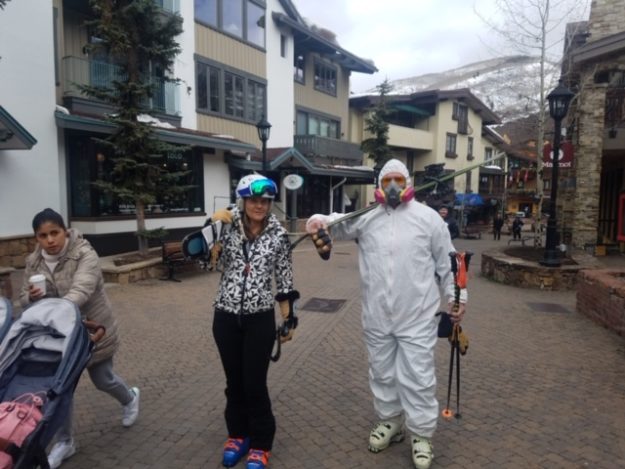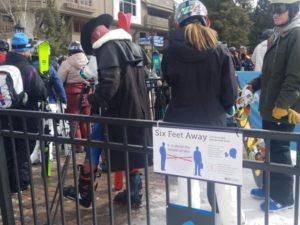Widgetized Section
Go to Admin » Appearance » Widgets » and move Gabfire Widget: Social into that MastheadOverlay zone
Vail was open for business (almost as usual) until all of a sudden it wasn’t

For a mid-March Saturday in the middle of spring break, Vail was eerily empty March 14 on what may turn out to be the final day of the 2019-20 season. Vail Resorts at the end of the day announced it’s closing all North American ski operations through at least March 22.
There were no cars parked along the frontage roads and Vail Village was largely deserted Saturday morning. One iconic Vail restaurant, Sweet Basil, is shut down for at least two weeks after an employee tested positive for the COVID-19 virus. Other nearby businesses had already shuttered with employees testing positive.

A well-known Vail après ski musician and realtor tested positive and is battling for his life in a Denver ICU, according to his sister on Facebook. In fact, Vail and surrounding Eagle County are a COVID-19 hot spot that Gov. Jared Polis said on Wednesday people over 60 or with certain preexisting health conditions should avoid. Polis cited capacity issues for high-country hospitals.
“Our hospital has said that they are struggling with large employers who have had a case and then they’re making all their employees go get tested before they can come back to work, and we can’t handle it,” Eagle County spokeswoman Kris Widlak said Saturday. “The hospital system and the medical providers cannot handle that.”
Widlak would not say who that large employer is, and Vail Resorts last week did not respond to a request for comment on the status of its employees who may have tested positive. Release of that information is up to the individual employers such as Sweet Basil, which went public with its closure. Widlak cited a lack of test kits, protective gear and health care personnel to handle a big spike in cases locally.
“It could be all of it at any given time,” Widlak said. “It could be the actual personnel. It could be the personal protective equipment they have to wear while their testing and it can be test kits. And I don’t know where the levels are of any of those things. We just know that there’s three different ways we could get overwhelmed with that.”
Vail Health CEO Will Cook issued a public statement on Saturday as chairlifts were continuing to transport snow riders up Vail and Beaver Creek mountains.
As of Saturday afternoon, Eagle County was tied with Denver for the most COVID-19 cases in the state at 20 apiece, including two Eagle County visitors from out of state who are now being isolated locally. County health officials are close to discontinuing investigations of who sick people may have contacted because the community spread now makes it irrelevant, Widlak said.
Vail Resorts is shutting down Vail, Beaver Creek, Breckenridge and Keystone in Colorado starting Sunday and at least through March 22. Vail Resorts’ CEO Rob Katz wrote in a statement that the resorts may reopen then, and the company will have an update by Friday, March 20.

“This decision provides a pause for the entire ecosystem of our mountain resort communities,” Katz wrote. “It gives everyone the time to assess the situation, respond to ever-changing developments, and evaluate the approach for the rest of season, if we believe it is advisable or feasible to re-open. This was not an easy decision to make, as we deeply considered the impact it will have on our guests, employees, and the people and businesses in our communities.”
The company is also working on its Epic Pass season pass policy, which Katz pointed out is non-fundable and non-transferable to next season.
Starting with Vail Resorts (Epic Pass) at 4 p.m. on Saturday and followed by first Alterra Mountain Company (Ikon Pass) at 6 p.m. and then Aspen Skiing Company at 7 p.m., the state’s ski industry one by one started shutting down Colorado ski areas temporarily or indefinitely beginning Sunday, March 15. Polis praised Vail Resorts for its action and encouraged others to follow suit, and then at 8:30 p.m. he issued an executive order shuttering all the state’s ski areas for at least a week.
State Rep. Dylan Roberts, a resident of Avon at the base of Beaver Creek, said he’s keeping an eye on the economic situation in Colorado’s high country, although the General Assembly on Saturday suspended the session until March 30.
“I can say that the legislature stands ready to tend to the immediate business of the state and will likely be responsive to any economic stimulus or emergency measures that could be taken at the state level,” Roberts said. “We are in close contact with the executive branch and given this is hitting our part of the state particularly hard, I and my colleagues will continue to look for ways for the state government to support our mountain communities during this challenging time.”
Town of Vail officials last week declared a local disaster emergency to combat the spread of the virus, and the county has banned gatherings of 50 or more people, so it was increasingly creating a backlash to have the ski mountains of Vail and Beaver Creek still running on Saturday.
Resort workers on Saturday were trying to enforce social distancing policy of at least six feet and allowing as few as one or two people to board gondola cabins to avoid riding with strangers.
For that reason, the line at Gondola One — which blew up the internet with photos of epic crowds during a massive snow and wind event last month – was about 20 minutes Saturday morning. Vail Resorts staff was directing skiers and snowboarders to chairlifts with shorter lines.
Vail had stopped hot food service at all of its on-mountain restaurants and was instead offering just prepackaged food for sale, but a growing chorus of workers and even some guests were questioning keeping the lifts running.

“It’s not good for the ski town communities,” a reader wrote on RealVail.com on Saturday. “Everyone keeps coming up to ski because it’s open and it’s not stopping the spread of the virus. Not necessarily at the resorts, but in town at the grocery store, the drug store, the urgent care, gas station, restaurants.”
Ted Steers of Vail Village Rentals said he had initial cancellations last week from out of state guests not wanting to travel commercially, but he had actually recently added several bookings from people flying privately or driving up from the Front Range. He was offering discounts of up to 50% and argued the ski company should keep the lifts running.
“Vail Resorts is doing the state a disservice by shutting down the outdoor activities that are the least confined for people to continue normalcy,” Steers said on Friday. “They should maybe close down [on-mountain restaurants] and just have an outdoor barbecue going, and they could require people to wear neck gators.”
As of Saturday morning, Taos Ski Valley in New Mexico and Jay Peak and Burke Mountain in Vermont had announced early closures due to the virus, and many European ski areas were shutting down early per government orders, including in Austria, Italy, France and Norway.
Vail Resorts either owns or operates 37 ski areas around the world, including Vail, Beaver Creek, Breckenridge and Keystone in Colorado. Vail was scheduled to close on April 19 this year, and Breckenridge was set to operate through Memorial Day.
An Aspen Skiing Company official last week and all the way up to 7 p.m. on Saturday said its four mountains would continue to operate under the Polis guidance aimed at 60-year-olds and people with health issues. The company then announced it would adhere to the governor’s order to shut down at least temporarily.
Polis issued that guidance at a press conference late Wednesday, citing an Australian woman visiting the Aspen area who apparently infected 10 of her countrymen before returning to Australia.
“…Travelers over 60 or with chronic health issues should avoid unnecessary travel to the high-country areas with the outbreaks, in particular because of the lack of health care capacity for hospitalization and ventilation in these areas …,” Polis said, also citing the high altitude.
One of the Australians, part of a group of 24 who vacation in Aspen every year, gave a radio interview to a Melbourne station last week while in isolation in an apartment in Aspen.
Melinda Williams, 60, of Melbourne, said both she and her husband had been infected by the young woman who returned to Australia and later tested positive. Williams said the young woman had been in Aspen for 10 or so days prior to the group arriving.
Williams said she and her husband had not been affected too intensely by the virus and considered themselves lucky with “just a bit of a cold.” Others in the group are sicker, she added, although “not hospital material.”
After initially being told by Pitkin County public health officials they couldn’t return to Australia for 14 days from infection, they are now being told they have to have two clean tests within a 24-hour period.
“We’ve been lucky it hasn’t hit us very hard,” Williams told Melbourne’s 3AW 693 News Talk. “It must be so contagious because most of the people in our group who have been concerned had minimal contact with this person.”
Asked by her interviewer if being trapped in an apartment in Aspen is all that bad, Williams replied that she can’t get her husband to play Scrabble anymore.
“The worst thing is I ran out of chardonnay, but luckily the local grog shop [liquor store] will deliver,” she said.
Aspen Skiing Company spokesman Jeff Hanle said it’s important to remember that COVID-19 knows no boundaries or borders. The Australian group, he added, has been out of circulation since March 8.
“They haven’t been out in the community since then, and we don’t know and no one knows where the first patient, who returned to Australia, picked up the infection,” Hanle said.
“It’s everywhere right now; it’s not a foreign disease,” he added. “There’s no cause for fear of people who are not from the same country you’re from. We can all get a cold, we can all get a flu, we can all spread [COVID-19]. It’s not something that is being spread strictly by international travelers.”
Earlier this month, according to Australian news outlets, a clinic in Melbourne closed after an Australian doctor visiting Vail returned home and later tested positive for COVID-19. He was later identified as Dr. Chris Higgins, the father of singer Missy Higgins.


